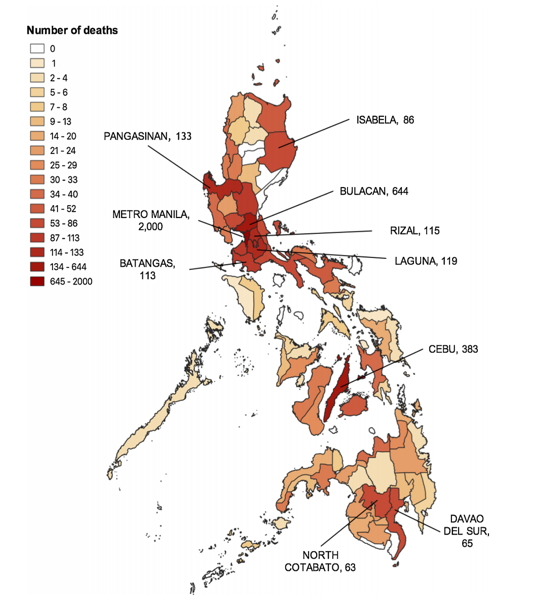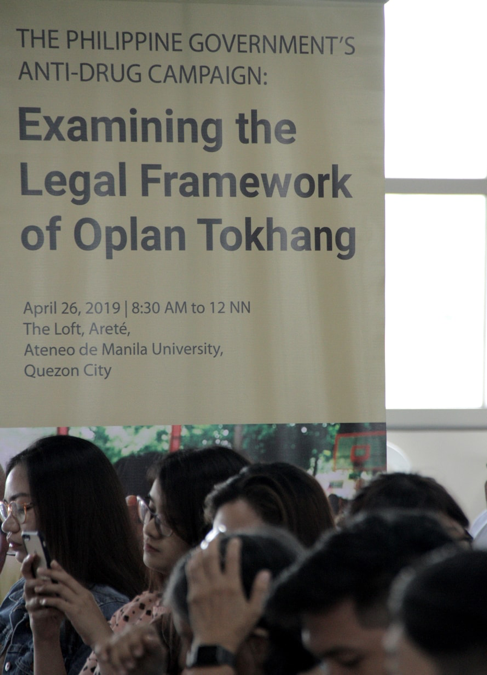Studies on drug-related killings published in international journals
02 Sep 2019
Two papers from one of the component projects of the Ateneo School of Government’s Multidisciplinary Research on Anti-Drug Campaigns in the Philippines have recently been published in international journals.
The paper titled The Philippines’ antidrug campaign: Spatial and temporal patterns of killings linked to drugs, co-authored by Dr. Ronald Mendoza (Dean and Professor at Ateneo School of Government), Dr. Clarissa David (Senior Research Fellow at Ateneo Policy Center and Professor at University of the Philippines-Diliman) and Dr. Cheryll Soriano (Associate Professor at De La Salle University), Jenna Mae Atun, and Radxeanel Peviluar Cossid (researchers at Ateneo Policy Center), has recently been published in the November 2019 issue of the International Journal of Drug Policy. The study used data drawn from a dataset of killings associated with the Philippine government’s antidrug campaign that was built using information from publicly available broadcast, print, or online news stories of reputable media agencies in the Philippines.
The paper describes the process of building the individual-level dataset and presents an analysis of 5,021 drug-related killings that occurred from May 10, 2016, a day after the presidential election, until September 29, 2017. Temporal analysis revealed the scale of the killings in the country, with the killings escalating from July 2016 and lasting throughout the rest of the year. Declines were observed during the suspensions of Oplan Tokhang and operations were moved to a non-police enforcement agency. The killings increased when the police handled the operations again. Meanwhile, spatial analysis showed a large concentration of killings in the National Capital Region, as well in the provinces of Bulacan and Cebu.

The findings, the authors pointed out, highlight the importance of making policy adjustments in the antidrug campaign. This involves looking into the role of local government in drug policy implementation, the disproportionate negative impacts of punitive and enforcement-led drug policies on urban and poor areas, the targeting of low-level suspected drug offenders, and the importance of data monitoring tools to ensure government transparency and accountability. The authors also discussed the importance of having independent monitoring systems especially when the government reports conflicting information.
Another paper titled Crystallising the official narrative: News discourses about the killings from the Philippine government’s campaign against illegal drugs has also been recently published in Journalism. The paper is co-authored by Dr. Cheryll Soriano, Dr. Clarissa David, and Jenna Mae Atun. The research team conducted a discourse analysis of 30 television stories, randomly selected from the news stories used in the dataset of drug-related killings, to extract the dominant frames and narratives used in the media coverage of the killings.
Results of the analyses show that reporters failed to be critical about the government narrative of the admission of guilt of those who were killed which was reinforced by signs left in the crime scene. The paper indicated that none of the 30 reports reviewed for the study raised a question on who placed the signs and why the signs are written in the first person. Dehumanization of victims was observed when reporters treat them as objects in a narrative. Despite producing special documentaries that highlighted the brutality and rapid rise of the killings, interest of news networks regarding the killings eventually dwindled and the media fell back to the tropes of typical crime reportage. Furthermore, the ‘event-focused’ slant, which dominates the media reports on the killings, inevitably solidifies the narrative that the deaths are a necessary consequence of a national public safety campaign. By relying almost exclusively on this narrative, to the exclusion of alternative frames, the media amplifies and crystallises the state’s narrative.
The authors raised important implications on the ethics and role of journalism in politics. They also highlighted how important it is for the media to be more reflective and conscientious about how they report crimes, especially when these crimes are connected to state-led programs and policies.
